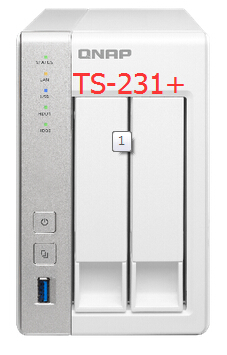QNAP

The QNAP NAS TS-231 forms the basis of our local network shares and backup
2x 2TB Western Digital "Red" drives in RAID 1 configuration = 1.8 TB storage
locally on the network, it uses DHCP, with two ethernet nics (dual-homed) Access it via your network share (at 192.168.1.4 or 192.168.1.5) or externally at http://cloud.equality-tech.com
Backups[edit]
| There is no bash history on QNAP. All 'history' is lost after each session! |
All content should go into user directories because subsequent upgrades could wipe data elsewhere. In other words, do NOT create a /backup folder!
/share/CACHEDEV1_DATA/homes/greg/backups/ is the root for backups storage |
I've created rsync scripts in the 'admin' users home directory which will backup eqt and greg-laptop nb: greg-laptop is ONLY the home directory, not the full disk.
There is also a Duplicity script in /share/CACHEDEV1_DATA/homes/greg/backups/backup_home_to_qnap_san.sh but that's not tested/operational
Operating System[edit]
The QNAP uses an operating system called QTS (based on Linux and GPL) QTS 4.2.1
Administration[edit]
Under the covers, the QNAP is a Linux box, so if you want to reset someones password, you can just use the passwd command as usual.
NAS Report[edit]
Here is a script which generates a script, and then runs it. Not sure why it's not just a plain script, but hey it's a neat trick. If you want to just use the script it generates, see /tmp/nasreport after invoking this.
cat ./nas_report.sh
#!/bin/sh
rm -f /tmp/nasreport
touch /tmp/nasreport
chmod +x /tmp/nasreport
cat <<EOF >>/tmp/nasreport
#!/bin/sh
#
# NAS Report by Patrick Wilson
# see: http://forum.qnap.com/viewtopic.php?f=185&t=82260#p366188
#
#
echo "*********************"
echo "** QNAP NAS Report **"
echo "*********************"
echo " "
echo "NAS Model: \$(getsysinfo model)"
echo "Firmware: \$(getcfg system version) Build \$(getcfg system 'Build Number')"
echo "System Name: \$(/bin/hostname)"
echo "Workgroup: \$(getcfg system workgroup)"
echo "Base Directory: \$(dirname \$(getcfg -f /etc/config/smb.conf Public path))"
echo "NAS IP address: \$(ifconfig \$(getcfg network 'Default GW Device') | grep addr: | awk '{ print \$2 }' | cut -d: -f2)"
echo " "
echo "Default Gateway Device: \$(getcfg network 'Default GW Device')"
echo " "
ifconfig \$(getcfg network 'Default GW Device') | grep -v HWaddr
echo " "
echo -n "DNS Nameserver(s):"
cat /etc/resolv.conf | grep nameserver | cut -d' ' -f2
echo " "
echo " "
echo "HDD Information:"
echo " "
alpha='abcdefghijklmnopqrstuvwxyz'
drives=\$(getcfg Storage 'Disk Drive Number')
for ((i=1;i<=drives;++i)) ; do
echo -n "HDD\$i -"
if [ ! -b /dev/sd\${alpha:\$i-1:1} ] ; then
echo "Drive absent"
else
hdparm -i /dev/sd\${alpha:\$i-1:1} | grep "Model"
echo " "
parted /dev/sd\${alpha:\$i-1:1} print
echo " "
/sbin/get_hd_smartinfo -d \$i
echo " "
fi
done
echo "Volume Status"
echo " "
mdadm -D /dev/md0 /dev/md1 2>/dev/null
echo " "
cat /proc/mdstat
echo " "
echo "Disk Space:"
echo " "
df -h | grep -v qpkg
echo " "
echo "Mount Status:"
echo " "
mount | grep -v qpkg
echo " "
echo "Contents of \$(dirname \$(getcfg -f /etc/config/smb.conf Public path)):"
echo " "
ls -lF \$(dirname \$(getcfg -f /etc/config/smb.conf Public path))/
echo " "
echo "Windows Shares:"
echo " "
for i in \$(grep \] /etc/config/smb.conf | sed 's/^\[//g' | sed 's/\]//g' | grep -v global) ;do
echo -n "\$i:"
testparm -s -l --section-name="\$i" --parameter-name=path 2>/dev/null
done
echo " "
echo "QNAP Media Scanner / Transcoder processes running: "
echo " "
/bin/ps | grep medialibrary | grep -v grep
echo " "
echo -n "MediaLibrary Configuration file: "
ls -alF /etc/config/medialibrary.conf
echo " "
echo "/etc/config/medialibrary.conf:"
cat /etc/config/medialibrary.conf
echo " "
echo "iTunes Music Store: \$(getcfg -f /etc/config/mt-daapd.conf general mp3_dir)"
echo " "
echo "Memory Information:"
echo " "
free | grep -v cache:
echo " "
echo "NASReport completed on \$(date +'%Y-%m-%d %T') (\$0) "
echo " "
EOF
sleep 2
clear
/tmp/nasreportUtilities[edit]
The NAS is not a full linux box. It only comes with a limited subset of commands, and some of those are provided by BusyBox. To see the output below, just run the busybox command.
BusyBox v1.01 (2016.05.31-18:24+0000) multi-call binary
Usage: busybox [function] [arguments]...
or: [function] [arguments]...
BusyBox is a multi-call binary that combines many common Unix
utilities into a single executable. Most people will create a
link to busybox for each function they wish to use and BusyBox
will act like whatever it was invoked as!
Currently defined functions:
[, addgroup, adduser, ash, awk, basename, bunzip2, busybox, bzcat, cat, chgrp, chmod, chown, chroot, chvt, clear, cmp, cp, crond, crontab, cut, date, dc, dd, deallocvt, delgroup, deluser, df, dirname, dmesg, dos2unix, du, echo, egrep, env, expr, false, fdisk, fgrep, find, free, getty, grep, gunzip, gzip, halt, head, hexdump, hostname, hwclock, id, ifconfig, init, insmod, install, ip, kill, killall, klogd, linuxrc, ln, logger, login, ls, lsmod, md5sum, mkdir, mknod, mktemp, modprobe, more, mount, mv, nameif, netstat, nslookup, openvt, passwd, pidof, ping, ping6, pivot_root, poweroff, ps, pwd, rdate, readlink, reboot, renice, reset, rm, rmdir, rmmod, route, sed, sh, sha1sum, sleep, sort, strings, swapoff, swapon, switch_root, sync, sysctl, syslogd, tail, tar, tee, telnet, test, tftp, time, top, touch, tr, traceroute, true, tty, umount, uname, uniq, unix2dos, unzip, uptime, usleep, vi, wc, wget, which, whoami, xargs, yes, zcat
There are also a number of commands which are NOT provided by busybox.
ls -al /mnt/HDA_ROOT/usr/bin |grep -v busyboxls -al /mnt/HDA_ROOT/usr/sbin